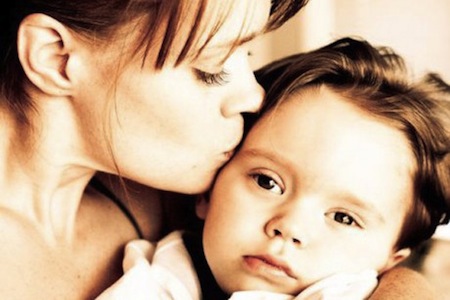Nicole Rodgers spoke with regular Role/Reboot contributor Emily Rapp about her latest book, The Still Point of the Turning World, released today. The book, which details her journey caring for a terminally ill child, was one of Amazon’s Editor’s Picks this month for biographies and memoirs.
Nicole: As many of your readers may know, Ronan passed away just a couple weeks ago. Can I ask how you’re doing at the moment?
Emily: I am stunned, relieved, deeply sad, and slightly overwhelmed. I didn’t want him to suffer anymore, but of course I miss him terribly.
Tell me about the process of writing this book: How did you decide to write it, and what was the experience of telling your story?
I wrote the book out of what felt like sheer necessity. A friend of mine actually asked me if I wanted to write about Ronan (this was after she’d been on the phone with me for an hour, listening to me wail), and the suggestion stuck. And then it took hold. I felt compelled to write it and actually couldn’t stop. The book began as a series of stand-alone essays/blog posts that I was sending out into the world I think to try and make contact. Everyone grieves differently, and for me, I wanted to move out into the world, make contact. Some people go inward. I don’t think there’s a right or a wrong way, but there are very different strategies for managing grief. So the book was about putting out into the world some kind of effort at managing chaos. Also, it gave me something to do rather than run around howling and weeping.
You’ve written eloquently about the power of female friendships. Could you talk about the role friendships played for you throughout the process of dealing with Ronan’s disease, and in the past couple weeks?
My friends were my salvation. Interestingly, many of these women got to know one another through the process of helping me, and I feel like they’ve all become friends independently. We are a network, a net of comfort and support. It’s remarkable. This will sound terribly cliché, but I don’t know what I would have done without them. Truly.
You have said caring for a child with Tay-Sachs disease is the job of “parenting without a future.” What are the most important lessons you’ve learned from that, and how do you think those experiences will impact the rest of your life?
Ronan made me rethink everything in my life. This led to a lot of decisions that were both painful and liberating. He taught me the power of pure presence—it doesn’t mean I practice it perfectly, but I try to bear it in mind. It’s not easy, and I still make mistakes around it. I try to remember that Ronan never had a chance to make any decisions about what kind of life he wanted to lead, so I feel it’s my duty to live a big, full life. Even if that makes people uncomfortable.
I’ve noticed a huge number of people on your Facebook page leaving notes about how deeply moved they’ve been by your struggle, and many have expressed grieving for Ronan, even though they’ve never met him. I can’t help but think of that scene in Fight Club where Ed Norton’s character becomes addicted to attending support groups because the grieving provides him an emotional release he needs. How do you make sense of the huge outpouring of grief from people you don’t know, and how does it make you feel?
For the most part, I think this outpouring of emotion comes from a good place, so I try to take that for what it is. In general, I think it points to the fact that people want to have real conversations about life and death, and the ideas of ambition and redemption and what it means to live a meaningful life.
On a final note, I have a more general question for you. What initially drew me to your writing was the incredible honesty and vulnerability in the way you tell stories. I’m obsessed with myth-busting and exposing both the beauty and the ugly underbelly of so many aspects of our lives in regards to relationships and parenting and work and love, but very few people seem able to speak authentically about these experiences. Do you agree that that’s a rarity? And if so, why do you think that is? Is it a lack of self-awareness? Or self-preservation? (Or something else entirely?)
I think what you’re touching on is that many people operate from a fear-based view of the world. People don’t want to be outsiders. We don’t want to hurt people, offend people, live the wrong kind of life. But I think you have to live in your truth, you have to speak to it from an authentic place, even if it makes people squirm. No situation around any relationship is black or white, or easy to “understand.” It’s the grappling with these issues and questions that is important, not the finding of easy answers.
Related Links:

